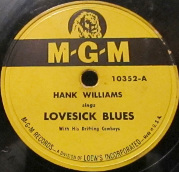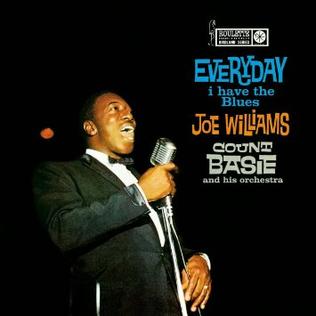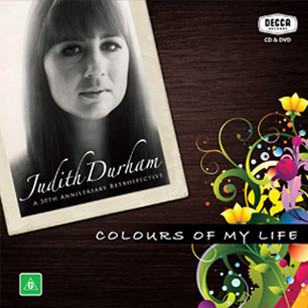
Judith Durham was an Australian singer, songwriter and musician who became the lead singer of the Australian folk music group The Seekers in 1963.

William James "Count" Basie was an American jazz pianist, organist, bandleader, and composer. In 1935, he formed the Count Basie Orchestra, and in 1936 took them to Chicago for a long engagement and their first recording. He led the group for almost 50 years, creating innovations like the use of two "split" tenor saxophones, emphasizing the rhythm section, riffing with a big band, using arrangers to broaden their sound, and others. Many musicians came to prominence under his direction, including the tenor saxophonists Lester Young and Herschel Evans, the guitarist Freddie Green, trumpeters Buck Clayton and Harry "Sweets" Edison, plunger trombonist Al Grey, and singers Jimmy Rushing, Helen Humes, Thelma Carpenter, and Joe Williams.

Clarence Williams was an American jazz pianist, composer, promoter, vocalist, theatrical producer, and publisher.

Dinah Washington was an American singer and pianist, one of the most popular black female recording artists of the 1950s. Primarily a jazz vocalist, she performed and recorded in a wide variety of styles including blues, R&B, and traditional pop music, and gave herself the title of "Queen of the Blues". She was a 1986 inductee of the Alabama Jazz Hall of Fame, and was inducted into the Rock and Roll Hall of Fame in 1993.

Susan Tedeschi is an American singer and guitarist. A multiple Grammy Award nominee, she is a member of the Tedeschi Trucks Band, a conglomeration of her band, her husband Derek Trucks’ band, and other musicians.

John Carl Hendricks, known professionally as Jon Hendricks, was an American jazz lyricist and singer. He is one of the originators of vocalese, which adds lyrics to existing instrumental songs and replaces many instruments with vocalists, such as the big-band arrangements of Duke Ellington and Count Basie. He is considered one of the best practitioners of scat singing, which involves vocal jazz soloing. Jazz critic and historian Leonard Feather called him the "Poet Laureate of Jazz", while Time dubbed him the "James Joyce of Jive". Al Jarreau called him "pound-for-pound the best jazz singer on the planet—maybe that's ever been".

Maurice White was an American singer, band leader, musician, songwriter, and record producer. He was best known as the founder, leader, main songwriter, and producer of the band Earth, Wind & Fire, and served as the band's co-lead singer with Philip Bailey.

Charles Douglas Musselwhite is an American blues harmonica player and bandleader, one of the white bluesmen who came to prominence, along with Mike Bloomfield, Paul Butterfield, and Elvin Bishop, as a pivotal figure in helping to revive the Chicago Blues movement of the 1960s. He has often been identified as a "white bluesman".

"Lovesick Blues" is a Tin Pan Alley song, composed by Cliff Friend, with lyrics by Irving Mills. It first appeared in the 1922 musical "Oh, Ernest", and was recorded that year by Elsie Clark and Jack Shea. Emmett Miller recorded it in 1925 and 1928, followed by country music singer Rex Griffin in 1939. The recordings by Griffin and Miller inspired Hank Williams to perform the song during his first appearances on the Louisiana Hayride radio show in 1948. Receiving an enthusiastic reception from the audience, Williams decided to record his own version despite initial push back from his producer Fred Rose and his band.

At Newport 1960 is a live album by Muddy Waters recorded during his performance at the Newport Jazz Festival on July 3, 1960. With his longtime backup band, Muddy Waters plays a mix of his older popular tunes and some newer compositions. Chess Records released the album in the United States on November 15, 1960.
"I Wish I Could Shimmy Like My Sister Kate", often simply "Sister Kate", is an up-tempo jazz dance song, written by Armand J. Piron and published in 1922.

"Basin Street Blues" is a song often performed by Dixieland jazz bands, written by Spencer Williams in 1928 and recorded that year by Louis Armstrong. The verse with the lyric "Won't you come along with me / To the Mississippi..." was later added by Glenn Miller and Jack Teagarden.
Margret RoadKnight is an Australian singer-guitarist. In a career spanning more than five decades, she has sung in a wide variety of styles including blues, jazz, gospel, comedy, cabaret, and folk. In January 1976 she released a cover version of Bob Hudson's album track, "Girls in Our Town", as a single, which reached the Kent Music Report Singles Chart Top 40.
The Third Australian Recording Industry Association Music Awards was held on 6 March 1989 at the Darling Harbour Convention Centre in Sydney. First Australian host Greedy Smith of Mental As Anything was assisted by presenters George Martin, Jono & Dano, Barry Bissell of Take 40 Australia, Peter Collins, Peter Jamieson, Jonathan King and Brian Smith to distribute 24 awards. There were no live performances and the awards were not televised.
Virginia Liston was an American classic female blues and jazz singer. She spent most of her career in vaudeville. She performed with her husband, Samuel H. Gray, as Liston and Liston. In the 1920s she made a series of recordings that included performances with Clarence Williams and his Blue Five on "You've Got the Right Key, but the Wrong Keyhole" and "Early in the Morning", and with the Clarence Williams Washboard Band on "Cushion Foot Stomp", and "P.D.Q. Blues".
"My Bucket's Got a Hole in It" is a song widely attributed to Clarence Williams, who obtained a copyright in 1933, although the melody was recorded under various names years earlier. The song became popular performed by Hank Williams for MGM and reached number 4 on the country chart in 1949.

Everyday I Have the Blues is an album by singer Joe Williams with Count Basie and His Orchestra featuring tracks recorded in 1959 which was originally released on the Roulette label.

Colours of My Life is a 2011 compilation album by Australian recording artist Judith Durham. The album was released in November 2011. A DVD was also included featuring an interview with Judith Durham by Peter Thompson.

Live in London is a 2014 live album by Australian recording artist Judith Durham. The album was recorded in London in 2003 to celebrate Durham's 60th birthday. The album released on CD and digitally in October 2014.

Judith Durham and The Hottest Band in Town volume 2 is the fifth studio album from Australian recording artist Judith Durham. The album was released in September 1974. The album was Durham's second album released via Pye Records.















